A Qualitative Study in Early Childhood Education and Care Settings
VerifiedAdded on 2021/06/17
|77
|21335
|42
Thesis and Dissertation
AI Summary
This dissertation presents a qualitative study conducted in an Early Childhood Education and Care setting, investigating how practitioners collaborate with parents to address challenges related to mother tongue and English language development in children aged 1 to 4. The study explores the importance of bilingualism and multilingualism in early childhood, emphasizing the role of practitioners and families in creating a supportive environment. Through semi-structured interviews with practitioners and parents, along with observations, the research examines the strategies used to overcome communication barriers and promote language skills. The findings highlight the use of practical examples and visual aids by practitioners, and the necessity of developing comprehensive communication, learning, and development programs. The study concludes with recommendations for practitioners and parents to support language acquisition in young children, emphasizing the importance of developing strong language skills for cognitive and social development. The dissertation also includes a thorough literature review, research methodology, findings, analysis, and conclusions.
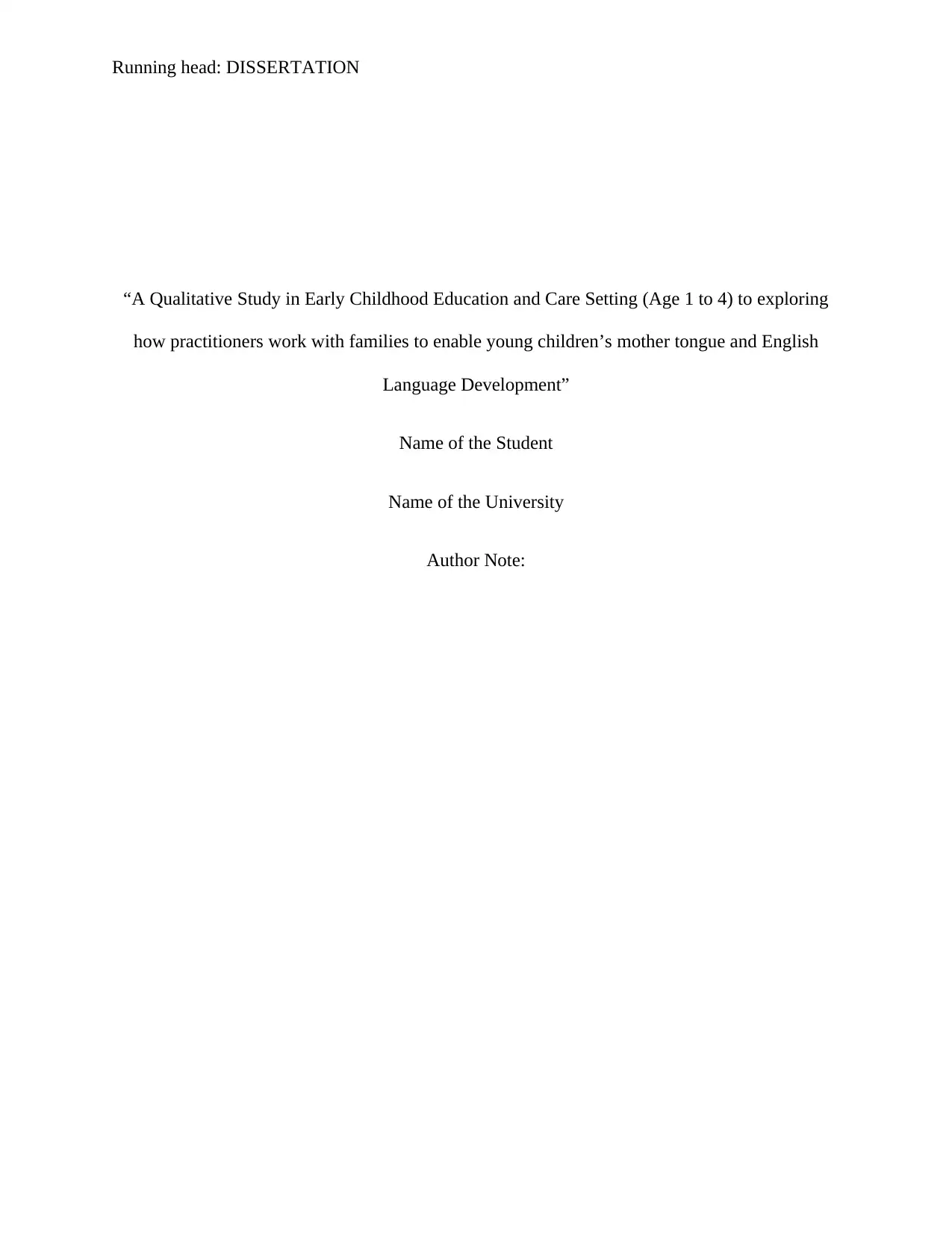
Running head: DISSERTATION
“A Qualitative Study in Early Childhood Education and Care Setting (Age 1 to 4) to exploring
how practitioners work with families to enable young children’s mother tongue and English
Language Development”
Name of the Student
Name of the University
Author Note:
“A Qualitative Study in Early Childhood Education and Care Setting (Age 1 to 4) to exploring
how practitioners work with families to enable young children’s mother tongue and English
Language Development”
Name of the Student
Name of the University
Author Note:
Paraphrase This Document
Need a fresh take? Get an instant paraphrase of this document with our AI Paraphraser
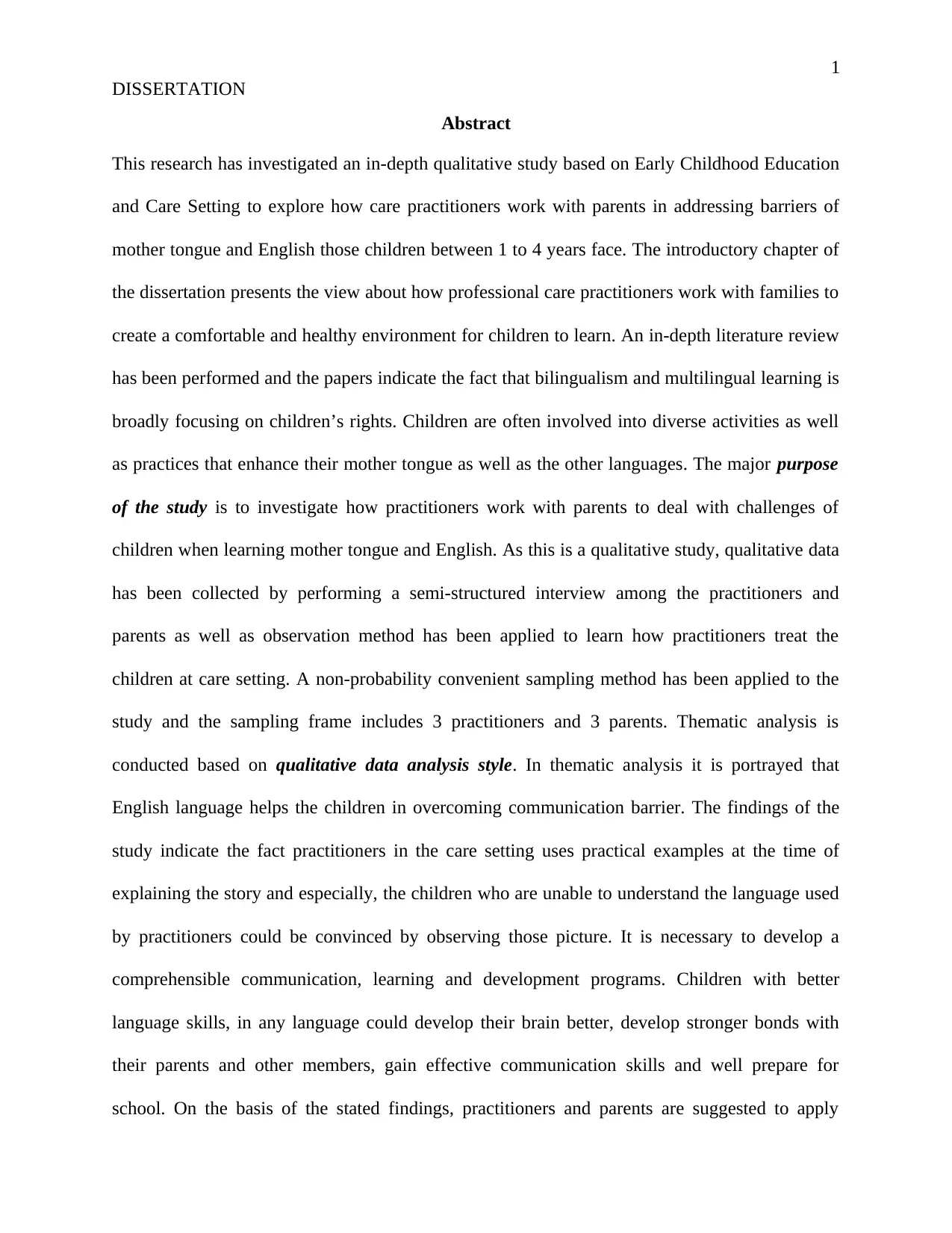
1
DISSERTATION
Abstract
This research has investigated an in-depth qualitative study based on Early Childhood Education
and Care Setting to explore how care practitioners work with parents in addressing barriers of
mother tongue and English those children between 1 to 4 years face. The introductory chapter of
the dissertation presents the view about how professional care practitioners work with families to
create a comfortable and healthy environment for children to learn. An in-depth literature review
has been performed and the papers indicate the fact that bilingualism and multilingual learning is
broadly focusing on children’s rights. Children are often involved into diverse activities as well
as practices that enhance their mother tongue as well as the other languages. The major purpose
of the study is to investigate how practitioners work with parents to deal with challenges of
children when learning mother tongue and English. As this is a qualitative study, qualitative data
has been collected by performing a semi-structured interview among the practitioners and
parents as well as observation method has been applied to learn how practitioners treat the
children at care setting. A non-probability convenient sampling method has been applied to the
study and the sampling frame includes 3 practitioners and 3 parents. Thematic analysis is
conducted based on qualitative data analysis style. In thematic analysis it is portrayed that
English language helps the children in overcoming communication barrier. The findings of the
study indicate the fact practitioners in the care setting uses practical examples at the time of
explaining the story and especially, the children who are unable to understand the language used
by practitioners could be convinced by observing those picture. It is necessary to develop a
comprehensible communication, learning and development programs. Children with better
language skills, in any language could develop their brain better, develop stronger bonds with
their parents and other members, gain effective communication skills and well prepare for
school. On the basis of the stated findings, practitioners and parents are suggested to apply
DISSERTATION
Abstract
This research has investigated an in-depth qualitative study based on Early Childhood Education
and Care Setting to explore how care practitioners work with parents in addressing barriers of
mother tongue and English those children between 1 to 4 years face. The introductory chapter of
the dissertation presents the view about how professional care practitioners work with families to
create a comfortable and healthy environment for children to learn. An in-depth literature review
has been performed and the papers indicate the fact that bilingualism and multilingual learning is
broadly focusing on children’s rights. Children are often involved into diverse activities as well
as practices that enhance their mother tongue as well as the other languages. The major purpose
of the study is to investigate how practitioners work with parents to deal with challenges of
children when learning mother tongue and English. As this is a qualitative study, qualitative data
has been collected by performing a semi-structured interview among the practitioners and
parents as well as observation method has been applied to learn how practitioners treat the
children at care setting. A non-probability convenient sampling method has been applied to the
study and the sampling frame includes 3 practitioners and 3 parents. Thematic analysis is
conducted based on qualitative data analysis style. In thematic analysis it is portrayed that
English language helps the children in overcoming communication barrier. The findings of the
study indicate the fact practitioners in the care setting uses practical examples at the time of
explaining the story and especially, the children who are unable to understand the language used
by practitioners could be convinced by observing those picture. It is necessary to develop a
comprehensible communication, learning and development programs. Children with better
language skills, in any language could develop their brain better, develop stronger bonds with
their parents and other members, gain effective communication skills and well prepare for
school. On the basis of the stated findings, practitioners and parents are suggested to apply
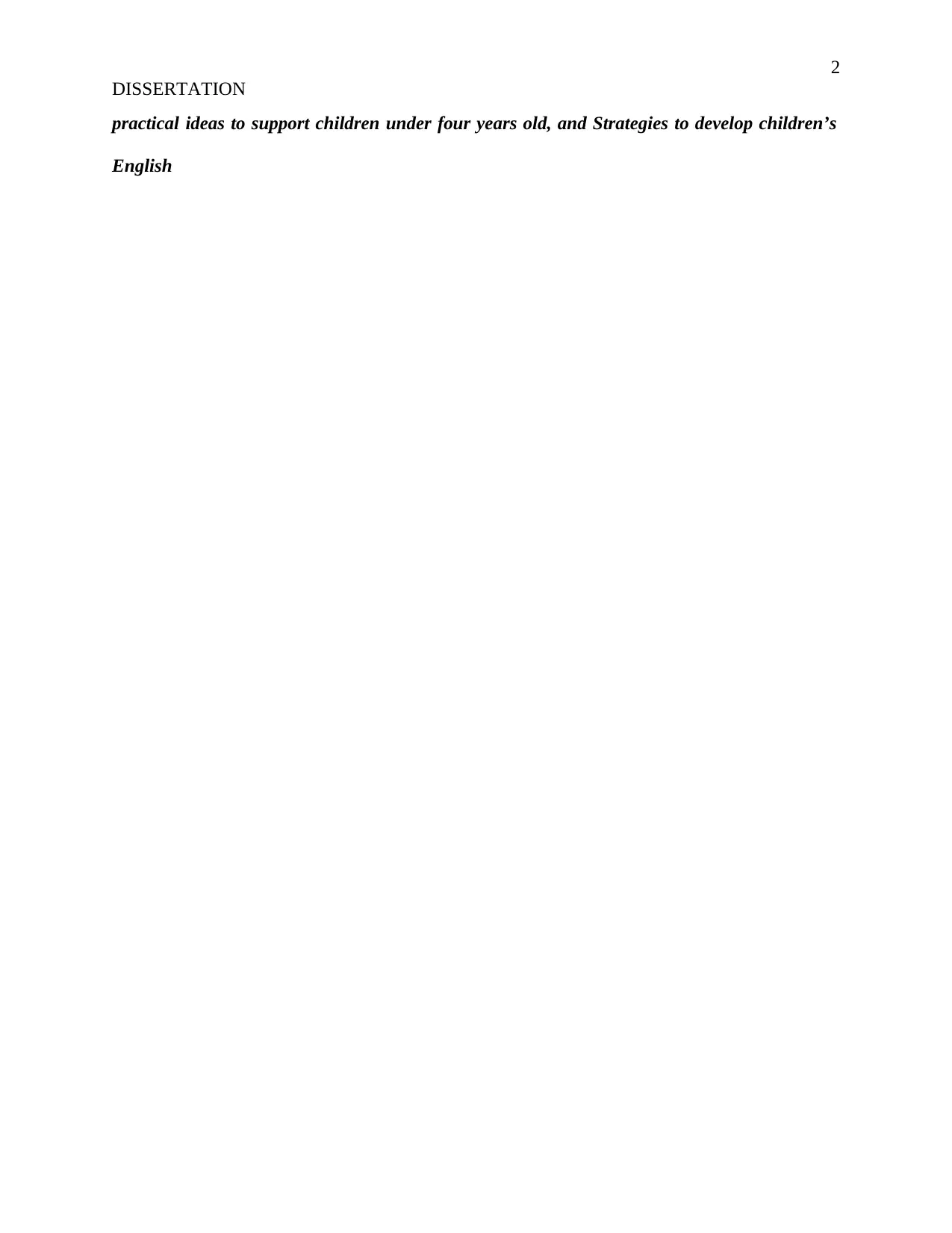
2
DISSERTATION
practical ideas to support children under four years old, and Strategies to develop children’s
English
DISSERTATION
practical ideas to support children under four years old, and Strategies to develop children’s
English
⊘ This is a preview!⊘
Do you want full access?
Subscribe today to unlock all pages.

Trusted by 1+ million students worldwide
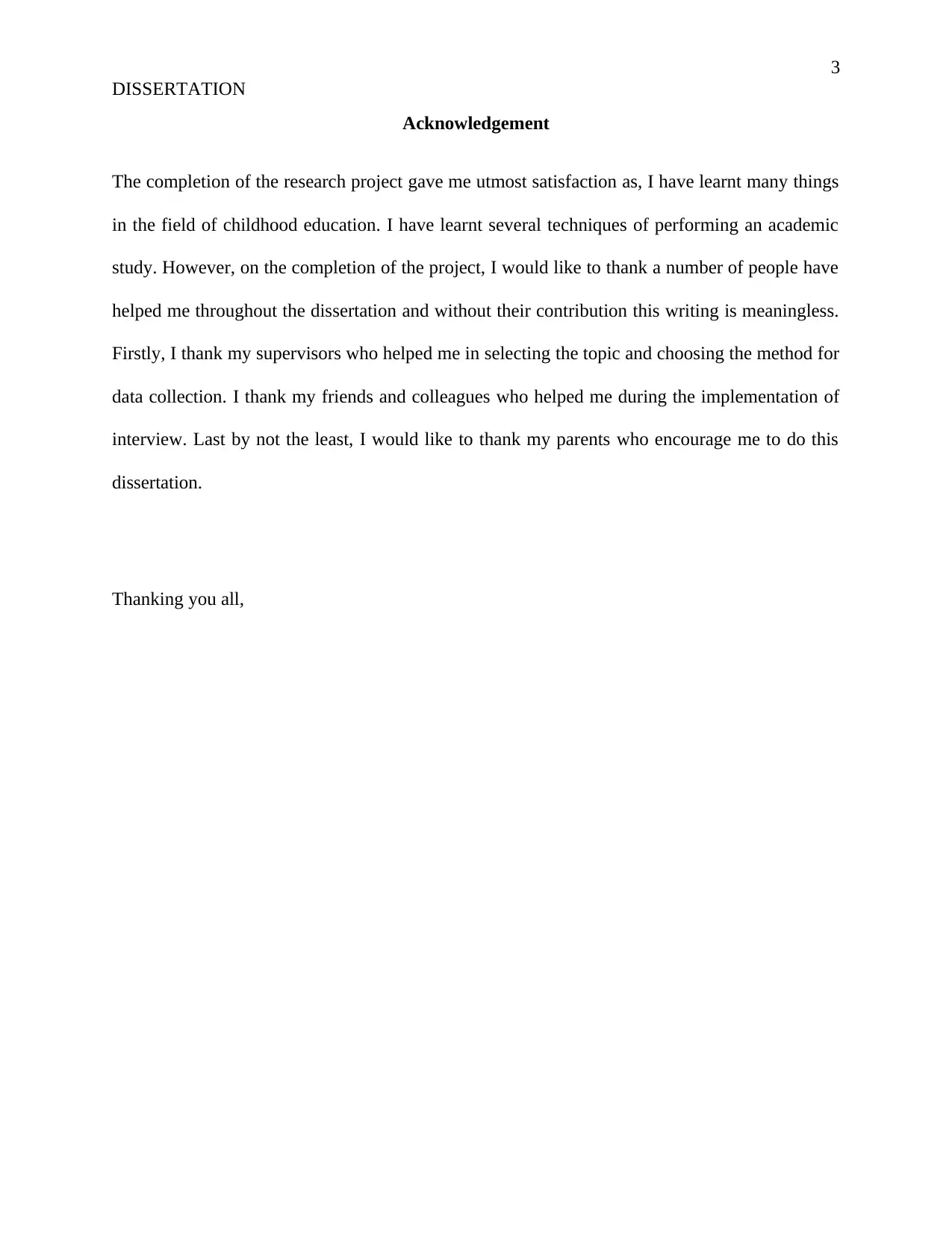
3
DISSERTATION
Acknowledgement
The completion of the research project gave me utmost satisfaction as, I have learnt many things
in the field of childhood education. I have learnt several techniques of performing an academic
study. However, on the completion of the project, I would like to thank a number of people have
helped me throughout the dissertation and without their contribution this writing is meaningless.
Firstly, I thank my supervisors who helped me in selecting the topic and choosing the method for
data collection. I thank my friends and colleagues who helped me during the implementation of
interview. Last by not the least, I would like to thank my parents who encourage me to do this
dissertation.
Thanking you all,
DISSERTATION
Acknowledgement
The completion of the research project gave me utmost satisfaction as, I have learnt many things
in the field of childhood education. I have learnt several techniques of performing an academic
study. However, on the completion of the project, I would like to thank a number of people have
helped me throughout the dissertation and without their contribution this writing is meaningless.
Firstly, I thank my supervisors who helped me in selecting the topic and choosing the method for
data collection. I thank my friends and colleagues who helped me during the implementation of
interview. Last by not the least, I would like to thank my parents who encourage me to do this
dissertation.
Thanking you all,
Paraphrase This Document
Need a fresh take? Get an instant paraphrase of this document with our AI Paraphraser
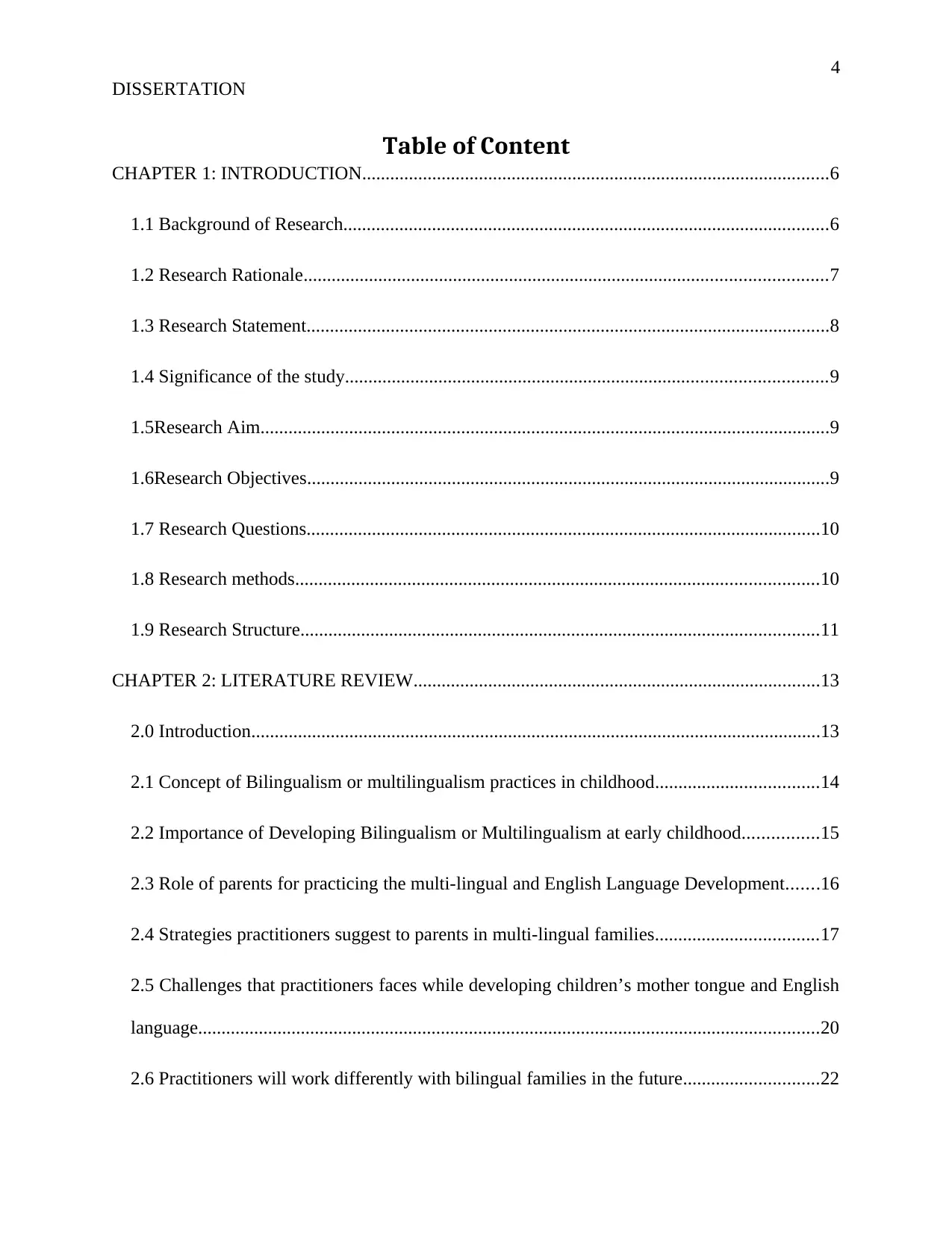
4
DISSERTATION
Table of Content
CHAPTER 1: INTRODUCTION....................................................................................................6
1.1 Background of Research........................................................................................................6
1.2 Research Rationale................................................................................................................7
1.3 Research Statement................................................................................................................8
1.4 Significance of the study.......................................................................................................9
1.5Research Aim..........................................................................................................................9
1.6Research Objectives................................................................................................................9
1.7 Research Questions..............................................................................................................10
1.8 Research methods................................................................................................................10
1.9 Research Structure...............................................................................................................11
CHAPTER 2: LITERATURE REVIEW.......................................................................................13
2.0 Introduction..........................................................................................................................13
2.1 Concept of Bilingualism or multilingualism practices in childhood...................................14
2.2 Importance of Developing Bilingualism or Multilingualism at early childhood................15
2.3 Role of parents for practicing the multi-lingual and English Language Development.......16
2.4 Strategies practitioners suggest to parents in multi-lingual families...................................17
2.5 Challenges that practitioners faces while developing children’s mother tongue and English
language.....................................................................................................................................20
2.6 Practitioners will work differently with bilingual families in the future.............................22
DISSERTATION
Table of Content
CHAPTER 1: INTRODUCTION....................................................................................................6
1.1 Background of Research........................................................................................................6
1.2 Research Rationale................................................................................................................7
1.3 Research Statement................................................................................................................8
1.4 Significance of the study.......................................................................................................9
1.5Research Aim..........................................................................................................................9
1.6Research Objectives................................................................................................................9
1.7 Research Questions..............................................................................................................10
1.8 Research methods................................................................................................................10
1.9 Research Structure...............................................................................................................11
CHAPTER 2: LITERATURE REVIEW.......................................................................................13
2.0 Introduction..........................................................................................................................13
2.1 Concept of Bilingualism or multilingualism practices in childhood...................................14
2.2 Importance of Developing Bilingualism or Multilingualism at early childhood................15
2.3 Role of parents for practicing the multi-lingual and English Language Development.......16
2.4 Strategies practitioners suggest to parents in multi-lingual families...................................17
2.5 Challenges that practitioners faces while developing children’s mother tongue and English
language.....................................................................................................................................20
2.6 Practitioners will work differently with bilingual families in the future.............................22
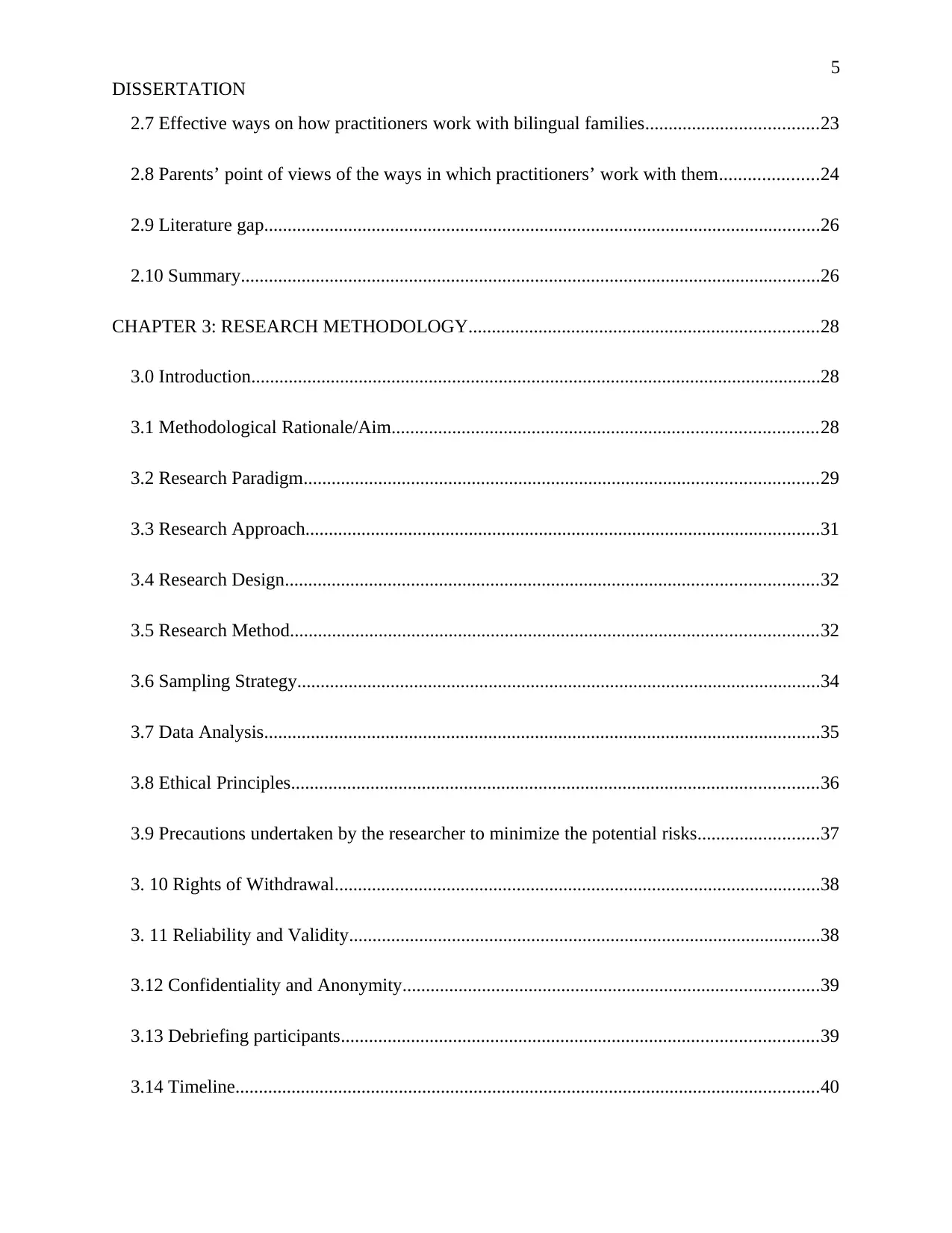
5
DISSERTATION
2.7 Effective ways on how practitioners work with bilingual families.....................................23
2.8 Parents’ point of views of the ways in which practitioners’ work with them.....................24
2.9 Literature gap.......................................................................................................................26
2.10 Summary............................................................................................................................26
CHAPTER 3: RESEARCH METHODOLOGY...........................................................................28
3.0 Introduction..........................................................................................................................28
3.1 Methodological Rationale/Aim...........................................................................................28
3.2 Research Paradigm..............................................................................................................29
3.3 Research Approach..............................................................................................................31
3.4 Research Design..................................................................................................................32
3.5 Research Method.................................................................................................................32
3.6 Sampling Strategy................................................................................................................34
3.7 Data Analysis.......................................................................................................................35
3.8 Ethical Principles.................................................................................................................36
3.9 Precautions undertaken by the researcher to minimize the potential risks..........................37
3. 10 Rights of Withdrawal........................................................................................................38
3. 11 Reliability and Validity.....................................................................................................38
3.12 Confidentiality and Anonymity.........................................................................................39
3.13 Debriefing participants......................................................................................................39
3.14 Timeline.............................................................................................................................40
DISSERTATION
2.7 Effective ways on how practitioners work with bilingual families.....................................23
2.8 Parents’ point of views of the ways in which practitioners’ work with them.....................24
2.9 Literature gap.......................................................................................................................26
2.10 Summary............................................................................................................................26
CHAPTER 3: RESEARCH METHODOLOGY...........................................................................28
3.0 Introduction..........................................................................................................................28
3.1 Methodological Rationale/Aim...........................................................................................28
3.2 Research Paradigm..............................................................................................................29
3.3 Research Approach..............................................................................................................31
3.4 Research Design..................................................................................................................32
3.5 Research Method.................................................................................................................32
3.6 Sampling Strategy................................................................................................................34
3.7 Data Analysis.......................................................................................................................35
3.8 Ethical Principles.................................................................................................................36
3.9 Precautions undertaken by the researcher to minimize the potential risks..........................37
3. 10 Rights of Withdrawal........................................................................................................38
3. 11 Reliability and Validity.....................................................................................................38
3.12 Confidentiality and Anonymity.........................................................................................39
3.13 Debriefing participants......................................................................................................39
3.14 Timeline.............................................................................................................................40
⊘ This is a preview!⊘
Do you want full access?
Subscribe today to unlock all pages.

Trusted by 1+ million students worldwide
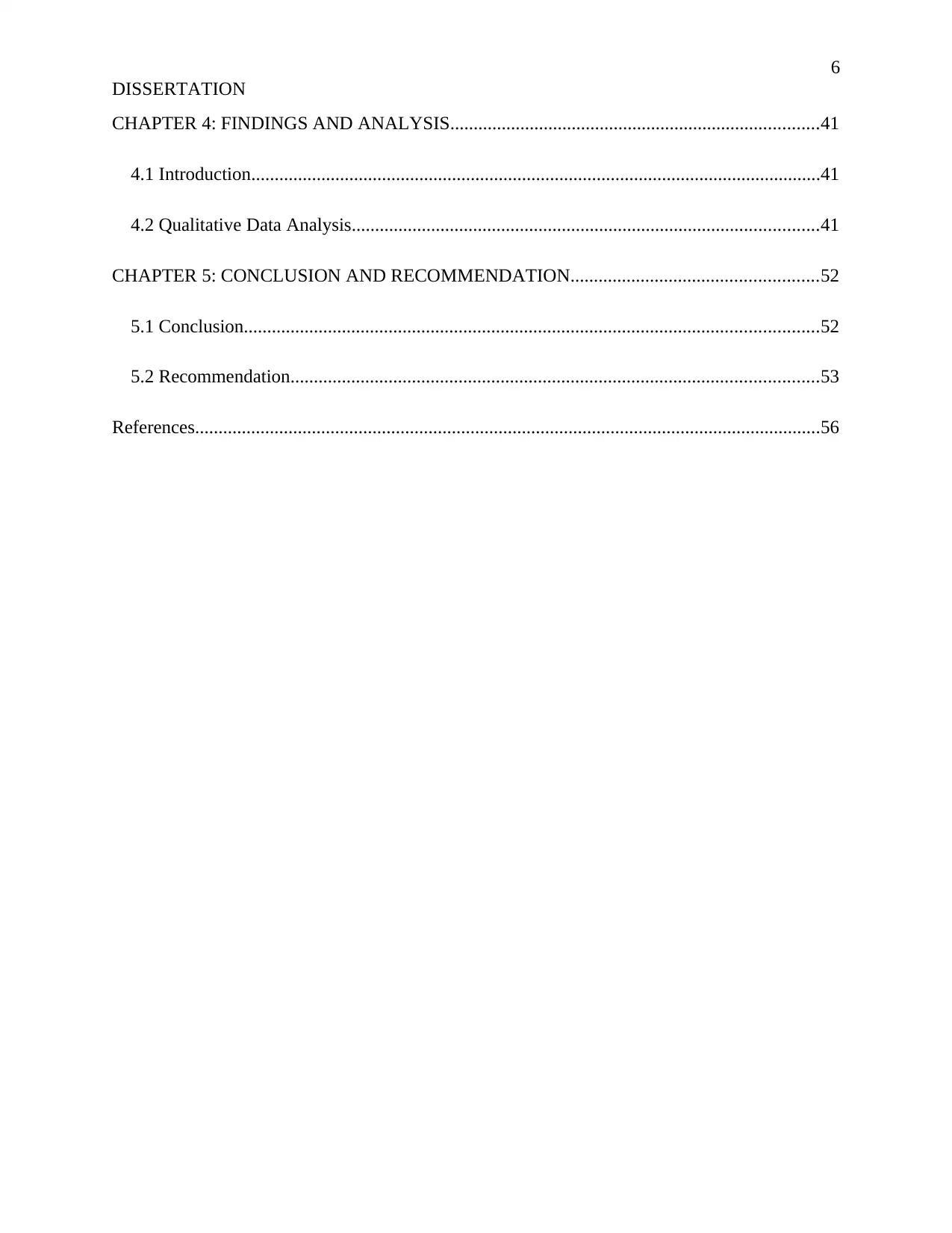
6
DISSERTATION
CHAPTER 4: FINDINGS AND ANALYSIS...............................................................................41
4.1 Introduction..........................................................................................................................41
4.2 Qualitative Data Analysis....................................................................................................41
CHAPTER 5: CONCLUSION AND RECOMMENDATION.....................................................52
5.1 Conclusion...........................................................................................................................52
5.2 Recommendation.................................................................................................................53
References......................................................................................................................................56
DISSERTATION
CHAPTER 4: FINDINGS AND ANALYSIS...............................................................................41
4.1 Introduction..........................................................................................................................41
4.2 Qualitative Data Analysis....................................................................................................41
CHAPTER 5: CONCLUSION AND RECOMMENDATION.....................................................52
5.1 Conclusion...........................................................................................................................52
5.2 Recommendation.................................................................................................................53
References......................................................................................................................................56
Paraphrase This Document
Need a fresh take? Get an instant paraphrase of this document with our AI Paraphraser
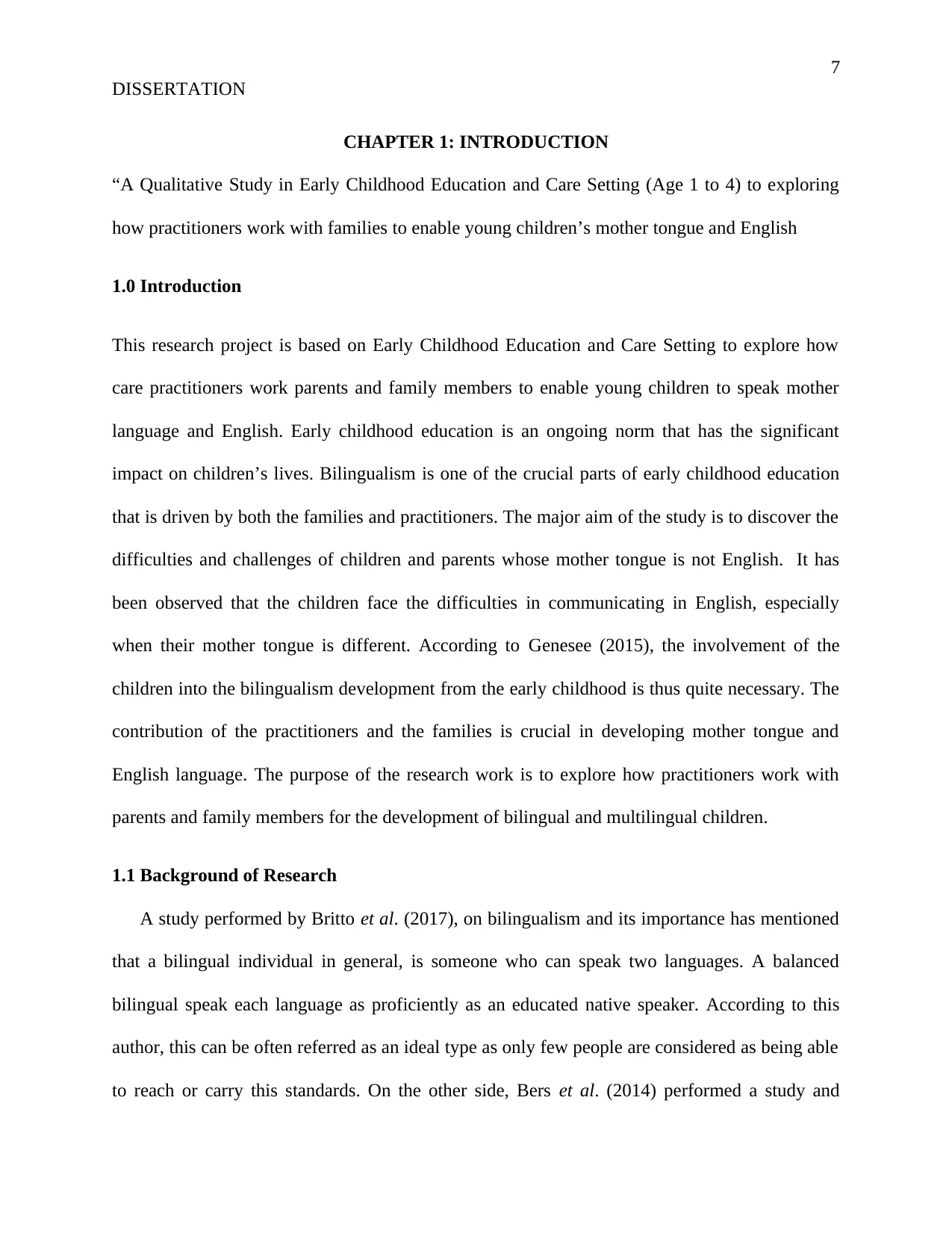
7
DISSERTATION
CHAPTER 1: INTRODUCTION
“A Qualitative Study in Early Childhood Education and Care Setting (Age 1 to 4) to exploring
how practitioners work with families to enable young children’s mother tongue and English
1.0 Introduction
This research project is based on Early Childhood Education and Care Setting to explore how
care practitioners work parents and family members to enable young children to speak mother
language and English. Early childhood education is an ongoing norm that has the significant
impact on children’s lives. Bilingualism is one of the crucial parts of early childhood education
that is driven by both the families and practitioners. The major aim of the study is to discover the
difficulties and challenges of children and parents whose mother tongue is not English. It has
been observed that the children face the difficulties in communicating in English, especially
when their mother tongue is different. According to Genesee (2015), the involvement of the
children into the bilingualism development from the early childhood is thus quite necessary. The
contribution of the practitioners and the families is crucial in developing mother tongue and
English language. The purpose of the research work is to explore how practitioners work with
parents and family members for the development of bilingual and multilingual children.
1.1 Background of Research
A study performed by Britto et al. (2017), on bilingualism and its importance has mentioned
that a bilingual individual in general, is someone who can speak two languages. A balanced
bilingual speak each language as proficiently as an educated native speaker. According to this
author, this can be often referred as an ideal type as only few people are considered as being able
to reach or carry this standards. On the other side, Bers et al. (2014) performed a study and
DISSERTATION
CHAPTER 1: INTRODUCTION
“A Qualitative Study in Early Childhood Education and Care Setting (Age 1 to 4) to exploring
how practitioners work with families to enable young children’s mother tongue and English
1.0 Introduction
This research project is based on Early Childhood Education and Care Setting to explore how
care practitioners work parents and family members to enable young children to speak mother
language and English. Early childhood education is an ongoing norm that has the significant
impact on children’s lives. Bilingualism is one of the crucial parts of early childhood education
that is driven by both the families and practitioners. The major aim of the study is to discover the
difficulties and challenges of children and parents whose mother tongue is not English. It has
been observed that the children face the difficulties in communicating in English, especially
when their mother tongue is different. According to Genesee (2015), the involvement of the
children into the bilingualism development from the early childhood is thus quite necessary. The
contribution of the practitioners and the families is crucial in developing mother tongue and
English language. The purpose of the research work is to explore how practitioners work with
parents and family members for the development of bilingual and multilingual children.
1.1 Background of Research
A study performed by Britto et al. (2017), on bilingualism and its importance has mentioned
that a bilingual individual in general, is someone who can speak two languages. A balanced
bilingual speak each language as proficiently as an educated native speaker. According to this
author, this can be often referred as an ideal type as only few people are considered as being able
to reach or carry this standards. On the other side, Bers et al. (2014) performed a study and
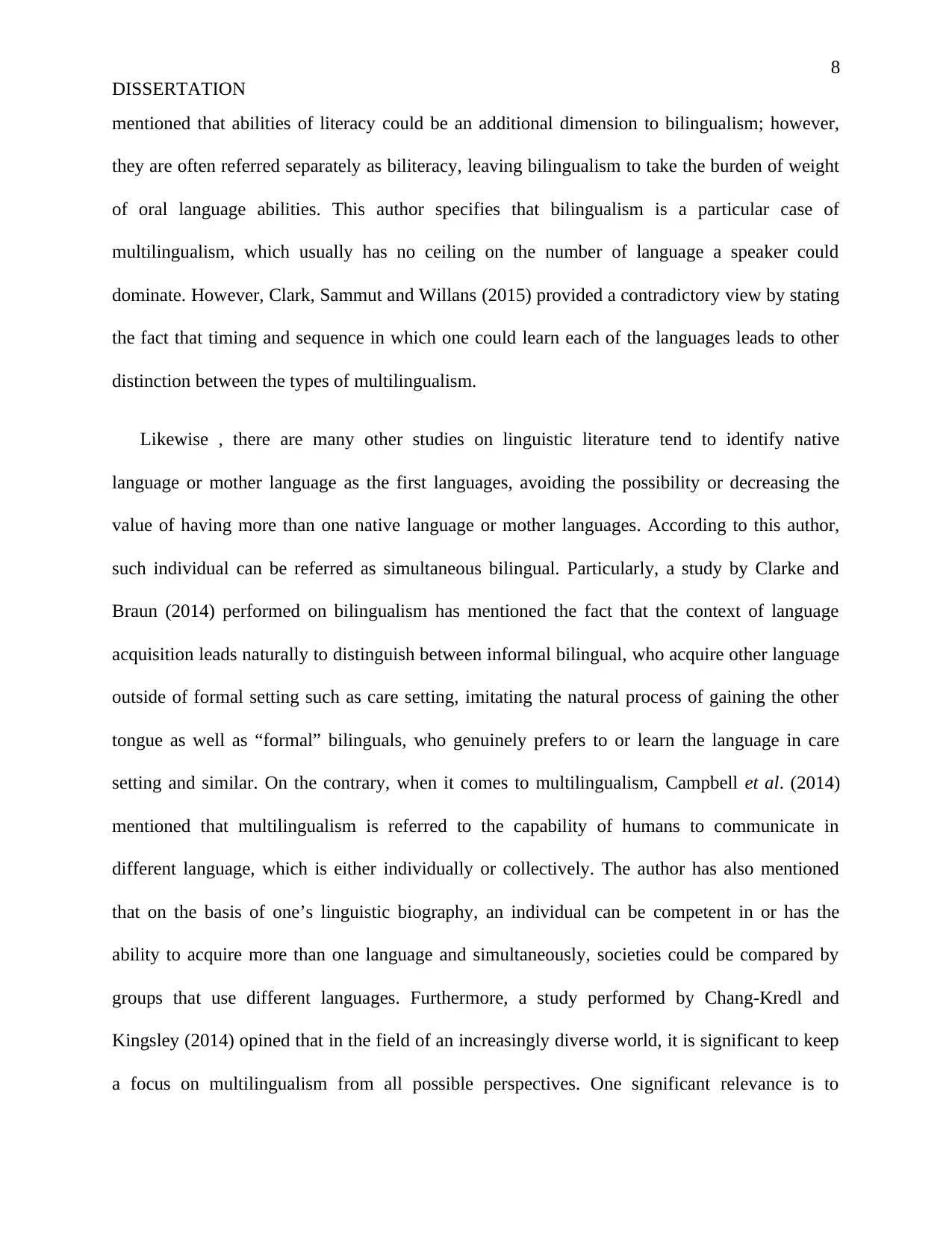
8
DISSERTATION
mentioned that abilities of literacy could be an additional dimension to bilingualism; however,
they are often referred separately as biliteracy, leaving bilingualism to take the burden of weight
of oral language abilities. This author specifies that bilingualism is a particular case of
multilingualism, which usually has no ceiling on the number of language a speaker could
dominate. However, Clark, Sammut and Willans (2015) provided a contradictory view by stating
the fact that timing and sequence in which one could learn each of the languages leads to other
distinction between the types of multilingualism.
Likewise , there are many other studies on linguistic literature tend to identify native
language or mother language as the first languages, avoiding the possibility or decreasing the
value of having more than one native language or mother languages. According to this author,
such individual can be referred as simultaneous bilingual. Particularly, a study by Clarke and
Braun (2014) performed on bilingualism has mentioned the fact that the context of language
acquisition leads naturally to distinguish between informal bilingual, who acquire other language
outside of formal setting such as care setting, imitating the natural process of gaining the other
tongue as well as “formal” bilinguals, who genuinely prefers to or learn the language in care
setting and similar. On the contrary, when it comes to multilingualism, Campbell et al. (2014)
mentioned that multilingualism is referred to the capability of humans to communicate in
different language, which is either individually or collectively. The author has also mentioned
that on the basis of one’s linguistic biography, an individual can be competent in or has the
ability to acquire more than one language and simultaneously, societies could be compared by
groups that use different languages. Furthermore, a study performed by Chang-Kredl and
Kingsley (2014) opined that in the field of an increasingly diverse world, it is significant to keep
a focus on multilingualism from all possible perspectives. One significant relevance is to
DISSERTATION
mentioned that abilities of literacy could be an additional dimension to bilingualism; however,
they are often referred separately as biliteracy, leaving bilingualism to take the burden of weight
of oral language abilities. This author specifies that bilingualism is a particular case of
multilingualism, which usually has no ceiling on the number of language a speaker could
dominate. However, Clark, Sammut and Willans (2015) provided a contradictory view by stating
the fact that timing and sequence in which one could learn each of the languages leads to other
distinction between the types of multilingualism.
Likewise , there are many other studies on linguistic literature tend to identify native
language or mother language as the first languages, avoiding the possibility or decreasing the
value of having more than one native language or mother languages. According to this author,
such individual can be referred as simultaneous bilingual. Particularly, a study by Clarke and
Braun (2014) performed on bilingualism has mentioned the fact that the context of language
acquisition leads naturally to distinguish between informal bilingual, who acquire other language
outside of formal setting such as care setting, imitating the natural process of gaining the other
tongue as well as “formal” bilinguals, who genuinely prefers to or learn the language in care
setting and similar. On the contrary, when it comes to multilingualism, Campbell et al. (2014)
mentioned that multilingualism is referred to the capability of humans to communicate in
different language, which is either individually or collectively. The author has also mentioned
that on the basis of one’s linguistic biography, an individual can be competent in or has the
ability to acquire more than one language and simultaneously, societies could be compared by
groups that use different languages. Furthermore, a study performed by Chang-Kredl and
Kingsley (2014) opined that in the field of an increasingly diverse world, it is significant to keep
a focus on multilingualism from all possible perspectives. One significant relevance is to
⊘ This is a preview!⊘
Do you want full access?
Subscribe today to unlock all pages.

Trusted by 1+ million students worldwide
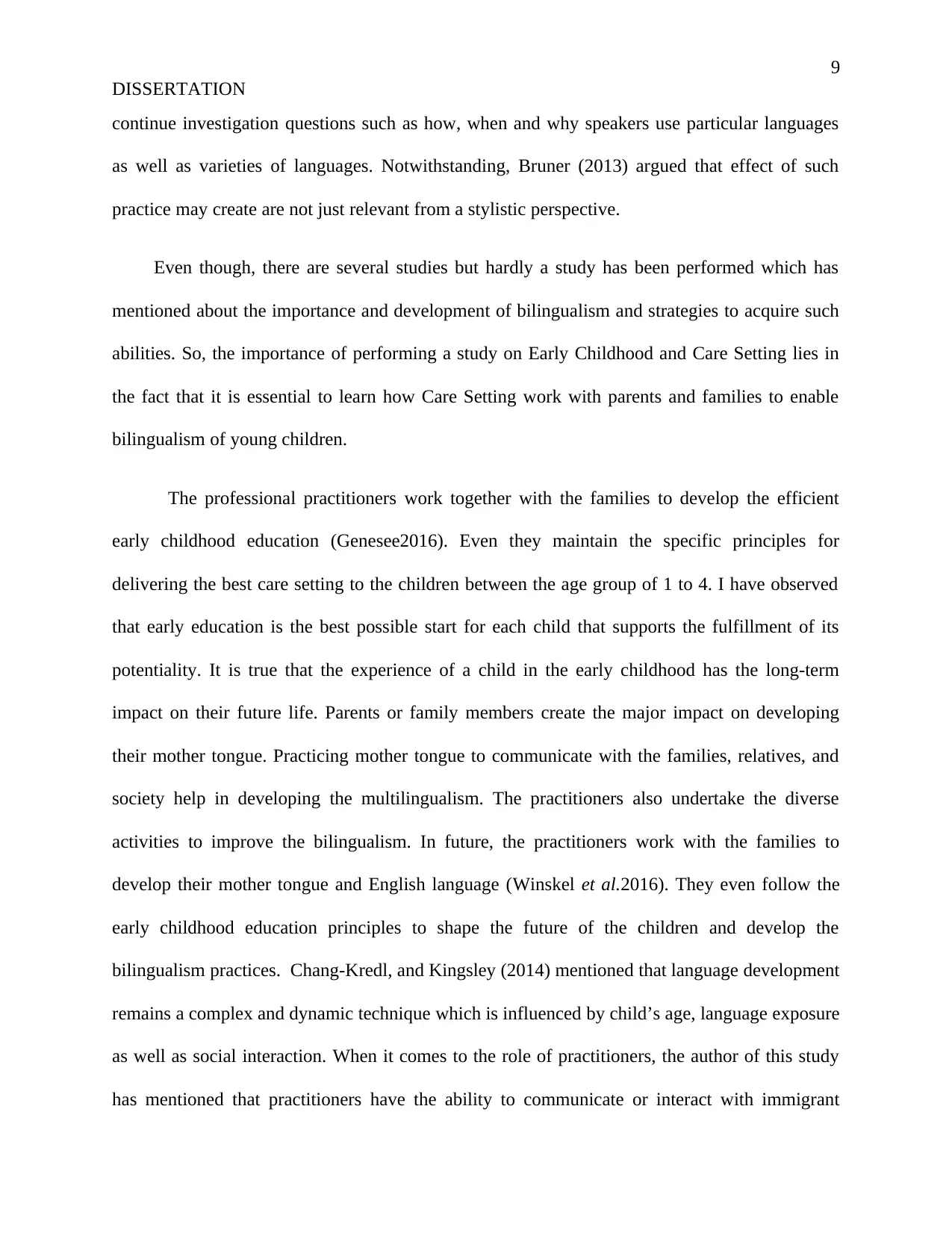
9
DISSERTATION
continue investigation questions such as how, when and why speakers use particular languages
as well as varieties of languages. Notwithstanding, Bruner (2013) argued that effect of such
practice may create are not just relevant from a stylistic perspective.
Even though, there are several studies but hardly a study has been performed which has
mentioned about the importance and development of bilingualism and strategies to acquire such
abilities. So, the importance of performing a study on Early Childhood and Care Setting lies in
the fact that it is essential to learn how Care Setting work with parents and families to enable
bilingualism of young children.
The professional practitioners work together with the families to develop the efficient
early childhood education (Genesee2016). Even they maintain the specific principles for
delivering the best care setting to the children between the age group of 1 to 4. I have observed
that early education is the best possible start for each child that supports the fulfillment of its
potentiality. It is true that the experience of a child in the early childhood has the long-term
impact on their future life. Parents or family members create the major impact on developing
their mother tongue. Practicing mother tongue to communicate with the families, relatives, and
society help in developing the multilingualism. The practitioners also undertake the diverse
activities to improve the bilingualism. In future, the practitioners work with the families to
develop their mother tongue and English language (Winskel et al.2016). They even follow the
early childhood education principles to shape the future of the children and develop the
bilingualism practices. Chang-Kredl, and Kingsley (2014) mentioned that language development
remains a complex and dynamic technique which is influenced by child’s age, language exposure
as well as social interaction. When it comes to the role of practitioners, the author of this study
has mentioned that practitioners have the ability to communicate or interact with immigrant
DISSERTATION
continue investigation questions such as how, when and why speakers use particular languages
as well as varieties of languages. Notwithstanding, Bruner (2013) argued that effect of such
practice may create are not just relevant from a stylistic perspective.
Even though, there are several studies but hardly a study has been performed which has
mentioned about the importance and development of bilingualism and strategies to acquire such
abilities. So, the importance of performing a study on Early Childhood and Care Setting lies in
the fact that it is essential to learn how Care Setting work with parents and families to enable
bilingualism of young children.
The professional practitioners work together with the families to develop the efficient
early childhood education (Genesee2016). Even they maintain the specific principles for
delivering the best care setting to the children between the age group of 1 to 4. I have observed
that early education is the best possible start for each child that supports the fulfillment of its
potentiality. It is true that the experience of a child in the early childhood has the long-term
impact on their future life. Parents or family members create the major impact on developing
their mother tongue. Practicing mother tongue to communicate with the families, relatives, and
society help in developing the multilingualism. The practitioners also undertake the diverse
activities to improve the bilingualism. In future, the practitioners work with the families to
develop their mother tongue and English language (Winskel et al.2016). They even follow the
early childhood education principles to shape the future of the children and develop the
bilingualism practices. Chang-Kredl, and Kingsley (2014) mentioned that language development
remains a complex and dynamic technique which is influenced by child’s age, language exposure
as well as social interaction. When it comes to the role of practitioners, the author of this study
has mentioned that practitioners have the ability to communicate or interact with immigrant
Paraphrase This Document
Need a fresh take? Get an instant paraphrase of this document with our AI Paraphraser
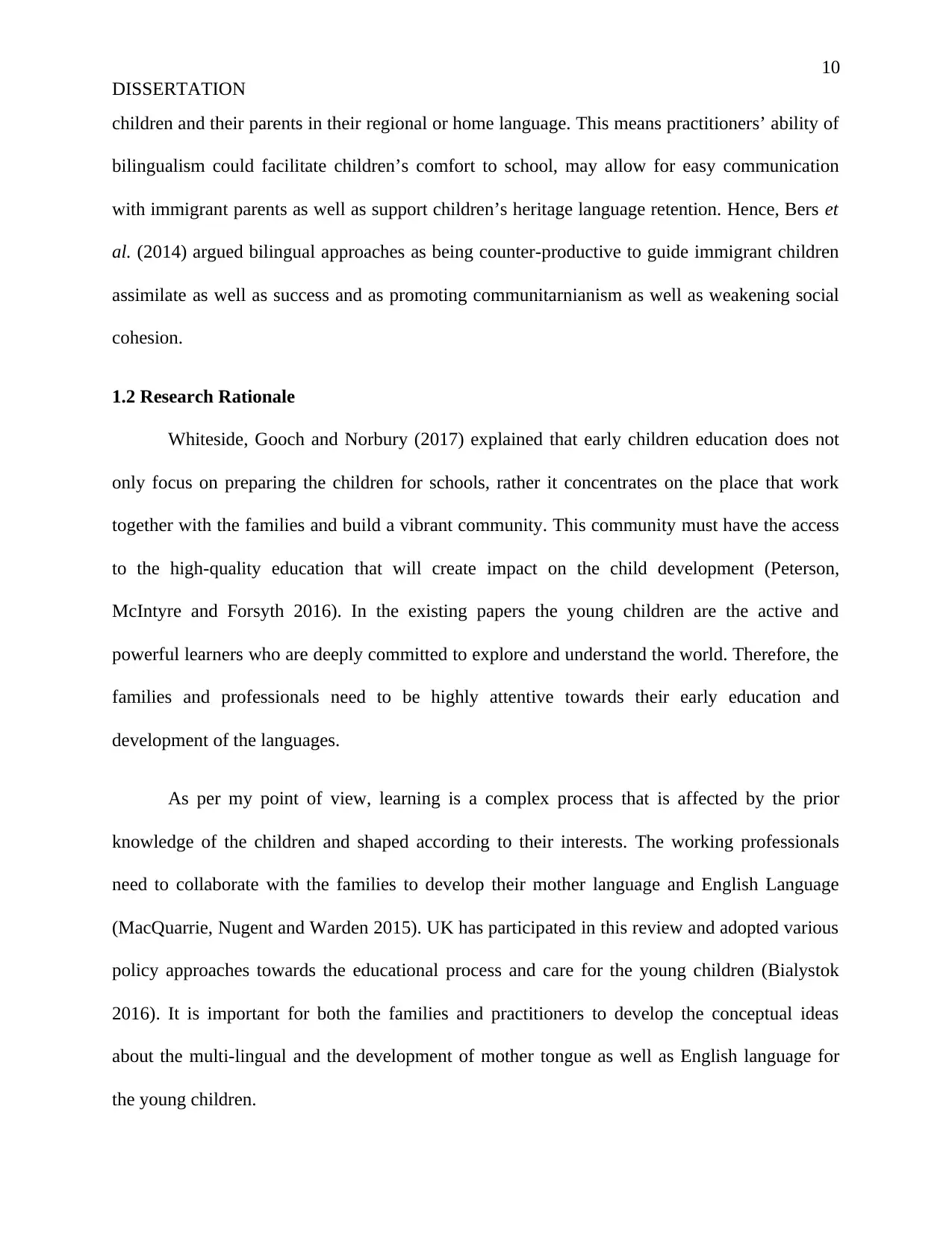
10
DISSERTATION
children and their parents in their regional or home language. This means practitioners’ ability of
bilingualism could facilitate children’s comfort to school, may allow for easy communication
with immigrant parents as well as support children’s heritage language retention. Hence, Bers et
al. (2014) argued bilingual approaches as being counter-productive to guide immigrant children
assimilate as well as success and as promoting communitarnianism as well as weakening social
cohesion.
1.2 Research Rationale
Whiteside, Gooch and Norbury (2017) explained that early children education does not
only focus on preparing the children for schools, rather it concentrates on the place that work
together with the families and build a vibrant community. This community must have the access
to the high-quality education that will create impact on the child development (Peterson,
McIntyre and Forsyth 2016). In the existing papers the young children are the active and
powerful learners who are deeply committed to explore and understand the world. Therefore, the
families and professionals need to be highly attentive towards their early education and
development of the languages.
As per my point of view, learning is a complex process that is affected by the prior
knowledge of the children and shaped according to their interests. The working professionals
need to collaborate with the families to develop their mother language and English Language
(MacQuarrie, Nugent and Warden 2015). UK has participated in this review and adopted various
policy approaches towards the educational process and care for the young children (Bialystok
2016). It is important for both the families and practitioners to develop the conceptual ideas
about the multi-lingual and the development of mother tongue as well as English language for
the young children.
DISSERTATION
children and their parents in their regional or home language. This means practitioners’ ability of
bilingualism could facilitate children’s comfort to school, may allow for easy communication
with immigrant parents as well as support children’s heritage language retention. Hence, Bers et
al. (2014) argued bilingual approaches as being counter-productive to guide immigrant children
assimilate as well as success and as promoting communitarnianism as well as weakening social
cohesion.
1.2 Research Rationale
Whiteside, Gooch and Norbury (2017) explained that early children education does not
only focus on preparing the children for schools, rather it concentrates on the place that work
together with the families and build a vibrant community. This community must have the access
to the high-quality education that will create impact on the child development (Peterson,
McIntyre and Forsyth 2016). In the existing papers the young children are the active and
powerful learners who are deeply committed to explore and understand the world. Therefore, the
families and professionals need to be highly attentive towards their early education and
development of the languages.
As per my point of view, learning is a complex process that is affected by the prior
knowledge of the children and shaped according to their interests. The working professionals
need to collaborate with the families to develop their mother language and English Language
(MacQuarrie, Nugent and Warden 2015). UK has participated in this review and adopted various
policy approaches towards the educational process and care for the young children (Bialystok
2016). It is important for both the families and practitioners to develop the conceptual ideas
about the multi-lingual and the development of mother tongue as well as English language for
the young children.
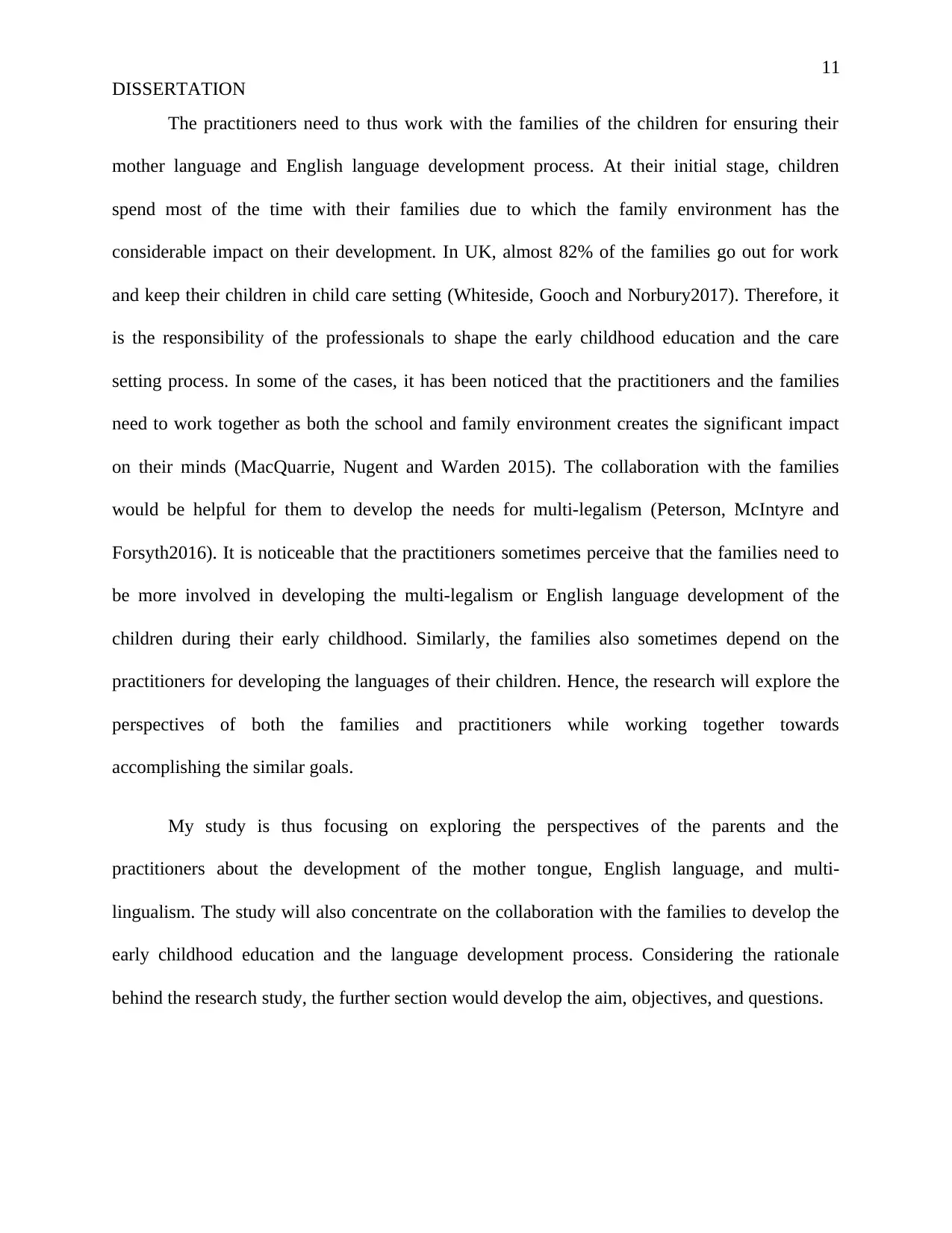
11
DISSERTATION
The practitioners need to thus work with the families of the children for ensuring their
mother language and English language development process. At their initial stage, children
spend most of the time with their families due to which the family environment has the
considerable impact on their development. In UK, almost 82% of the families go out for work
and keep their children in child care setting (Whiteside, Gooch and Norbury2017). Therefore, it
is the responsibility of the professionals to shape the early childhood education and the care
setting process. In some of the cases, it has been noticed that the practitioners and the families
need to work together as both the school and family environment creates the significant impact
on their minds (MacQuarrie, Nugent and Warden 2015). The collaboration with the families
would be helpful for them to develop the needs for multi-legalism (Peterson, McIntyre and
Forsyth2016). It is noticeable that the practitioners sometimes perceive that the families need to
be more involved in developing the multi-legalism or English language development of the
children during their early childhood. Similarly, the families also sometimes depend on the
practitioners for developing the languages of their children. Hence, the research will explore the
perspectives of both the families and practitioners while working together towards
accomplishing the similar goals.
My study is thus focusing on exploring the perspectives of the parents and the
practitioners about the development of the mother tongue, English language, and multi-
lingualism. The study will also concentrate on the collaboration with the families to develop the
early childhood education and the language development process. Considering the rationale
behind the research study, the further section would develop the aim, objectives, and questions.
DISSERTATION
The practitioners need to thus work with the families of the children for ensuring their
mother language and English language development process. At their initial stage, children
spend most of the time with their families due to which the family environment has the
considerable impact on their development. In UK, almost 82% of the families go out for work
and keep their children in child care setting (Whiteside, Gooch and Norbury2017). Therefore, it
is the responsibility of the professionals to shape the early childhood education and the care
setting process. In some of the cases, it has been noticed that the practitioners and the families
need to work together as both the school and family environment creates the significant impact
on their minds (MacQuarrie, Nugent and Warden 2015). The collaboration with the families
would be helpful for them to develop the needs for multi-legalism (Peterson, McIntyre and
Forsyth2016). It is noticeable that the practitioners sometimes perceive that the families need to
be more involved in developing the multi-legalism or English language development of the
children during their early childhood. Similarly, the families also sometimes depend on the
practitioners for developing the languages of their children. Hence, the research will explore the
perspectives of both the families and practitioners while working together towards
accomplishing the similar goals.
My study is thus focusing on exploring the perspectives of the parents and the
practitioners about the development of the mother tongue, English language, and multi-
lingualism. The study will also concentrate on the collaboration with the families to develop the
early childhood education and the language development process. Considering the rationale
behind the research study, the further section would develop the aim, objectives, and questions.
⊘ This is a preview!⊘
Do you want full access?
Subscribe today to unlock all pages.

Trusted by 1+ million students worldwide
1 out of 77
Related Documents
Your All-in-One AI-Powered Toolkit for Academic Success.
+13062052269
info@desklib.com
Available 24*7 on WhatsApp / Email
![[object Object]](/_next/static/media/star-bottom.7253800d.svg)
Unlock your academic potential
Copyright © 2020–2026 A2Z Services. All Rights Reserved. Developed and managed by ZUCOL.





